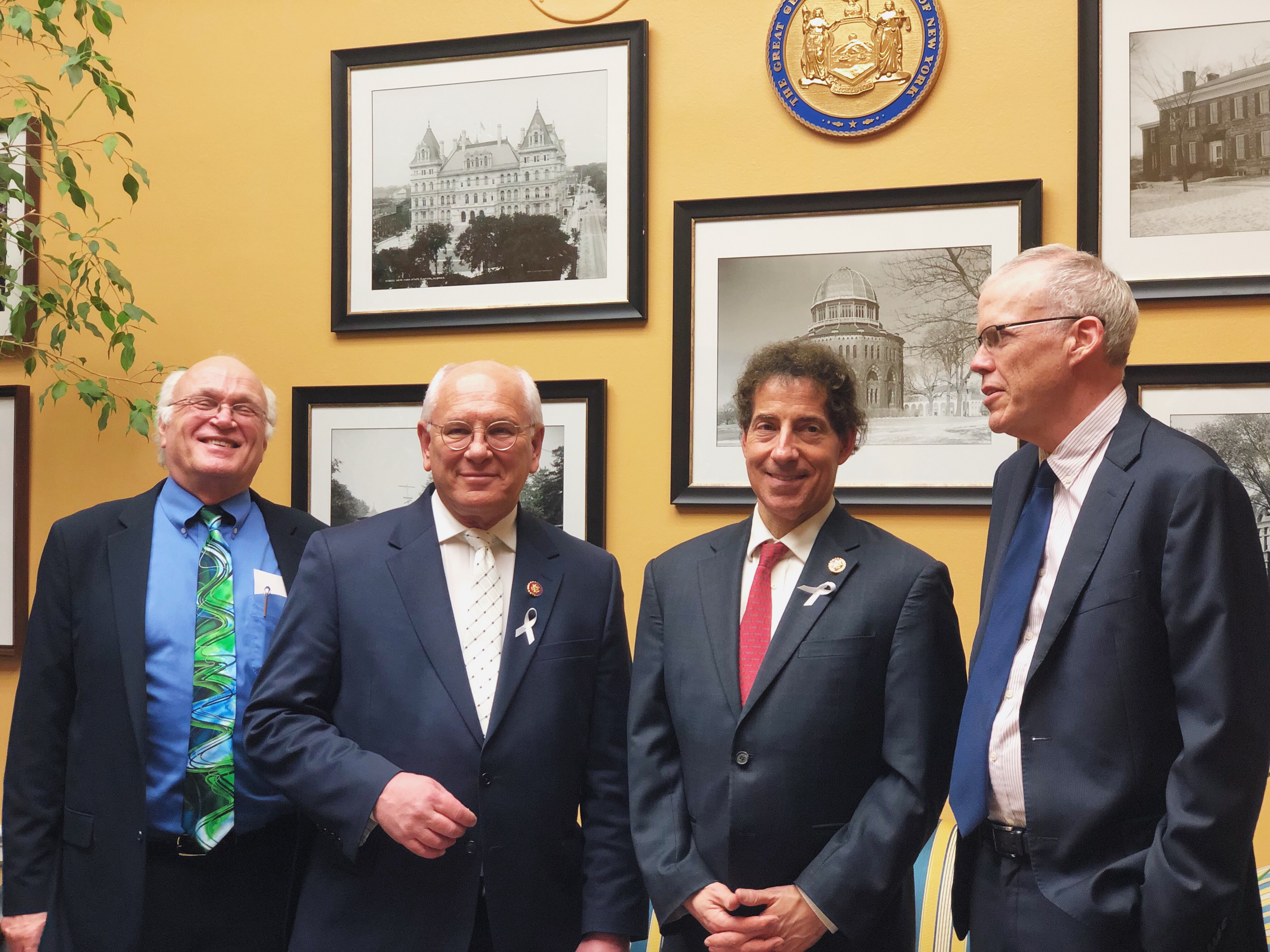WASHINGTON, D.C. — President Donald Trump bypassed climate issues during his State of the Union speech on Tuesday night, choosing instead to celebrate fossil fuels. But a number of guests in the crowd highlighted what Democratic lawmakers hope will be a new age for climate action.
With the first of a slate of environmental oversight hearings scheduled to begin Wednesday, a number of Democrats signaled their investment in acting on climate change Tuesday night. At a small gathering in his office, just two hours prior to the president’s speech, Rep. Paul Tonko (D-NY) emphasized the significance of his own guest to the State of the Union.
“We see the urgency here,” the chairman of the House subcommittee on the environment explained, gesturing to Gene Karpinski, president of the League of Conservation Voters (LCV), an environmental advocacy group.
“It’s great to have leaders in these key positions,” Karpinski said, beaming, before going on to declare that “the public understanding” of climate change is at its greatest point in history and that “the yearning for solutions is higher than it’s ever been.”
Karpinski was in good company on Tuesday night. A number of Senate and House Democrats extended invitations to guests notable for their work on environmental and climate issues, or for their personal experiences with climate impacts.
Vice Chair of the House Appropriations Committee on Interior & Environment Chellie Pingree (D-ME) brought Joel Clement, the whistleblower who challenged Trump’s climate policies during his time working with the Interior Department. California senator and contender for the 2020 presidential nomination Kamala Harris meanwhile brought an air traffic controller who was furloughed during the partial government shutdown and who lost her home in a California wildfire.
Supporters of the “Green New Deal” — an idea to rapidly decarbonize the economy proposed and supported by progressive groups like the Sunrise Movement — also signaled their investment in climate action Tuesday night.
Washington Rep. Pramila Jayapal (D) brought paleoclimatologist Lisa Graumlich with her, while Varshini Prakash, co-founder of the Sunrise Movement, attended as a guest of Sen. Ed Markey (D-MA).
Also in the room with Tonko on Tuesday night was Rep. Jamie Raskin (D-MD), along with his guest, Bill McKibben, the environmental activist who leads the group 350.org. Raskin referenced the current enthusiasm for climate action as a “spectacular breakthrough” following years of silence on the issue, something McKibben echoed.
“There’s no longer any escaping this question,” McKibben told ThinkProgress. “It’s clearly the most important issue in the world.”

Referencing a pre-State of the Union event held by the Sunrise Movement earlier Tuesday night, McKibben applauded the momentum and growing calls for a Green New Deal, even as he acknowledged that both the White House and the Senate present a barrier to climate action.
“No one is under any illusions that we’re about to pass sweeping climate legislation,” he said. “But, everybody by now [knows] that there’s a huge pent up demand for action on climate after, really, 30 years of inaction.”
That demand could be about to translate into something tangible. On Wednesday, the House Energy and Commerce Committee will hold the first committee meeting on climate change in six years. At the same time, Natural Resources Committee Chair Raúl Grijalva (D-AZ) will hold a hearing on climate impacts and the need for action. Rep. Betty McCollum (DFW-MN), meanwhile, will be holding yet another hearing looking into the Interior Department’s actions during the shutdown, including efforts to prioritize oil and gas drilling.
Wednesday’s full schedule stands in stark contrast to the president’s State of the Union address. During the speech, Trump avoided acknowledging climate change. Instead, the president hailed U.S. gains in oil and gas, to minimal applause from Democrats.
But climate advocates nonetheless sounded an upbeat note about potential Republican investment in climate action. Repeatedly calling for “science-based” and “evidence-based” policies, Tonko indicated that he believes members of both parties increasingly see the realities of climate change.
“We saw what happened in the Midwest this week, we saw the wildfires in California, the flooding in Florida, the flooding in Puerto Rico, in Texas, I mean the list goes on and on,” said Tonko, referencing a recent Arctic blast linked to climate change along with a number of disasters over the past few years.
“Weather alone has alerted us,” the congressman continued, “and I think it speaks to everyone’s senses, and I feel, I believe, that there is a beginning of an acceptance here to the concept of climate change.”
What that acceptance means for policy, however, could vary wildly.
McKibben loudly championed the Green New Deal on Tuesday and Karpinski eagerly praised the idea, saying his organization will be closely watching to see what resolution or bill ultimately emerges. Tonko meanwhile spoke to a “two-track system” involving carbon pricing on the one hand and working towards goals like grid modernization and shifting the U.S. transportation sector on the other. Those innovations, the congressman argued, will create jobs, something he believes will appeal to Republicans.
“I think there are things out there that industry would encourage them to pass,” he said.
McKibben echoed those sentiments and pointed to polls that have shown initial bipartisan interest in things like the Green New Deal. He also noted that climate realities are reaching a breaking point and that even deeply conservative lawmakers are grappling with that fact.
Underscoring his point, the activist referenced last year’s onslaught of natural disasters, which scientists have linked to global warming.
“When people think of California, they no longer think of beaches,” McKibben said. “They think of wildfires.”

